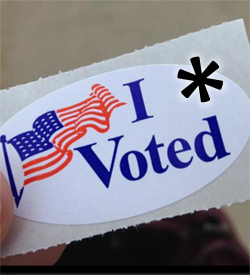Blind justice?
by Beth
 A post I published here on the Easter Seals blog last week explained how people who are blind like me can use a touch screen machine with audio output to vote independently. I wrote another post after that listing hotline numbers for people with disabilities to call if they encountered any problems voting at their polling places. Good thing that list of hotline numbers was here — I ended up referring to it myself!
A post I published here on the Easter Seals blog last week explained how people who are blind like me can use a touch screen machine with audio output to vote independently. I wrote another post after that listing hotline numbers for people with disabilities to call if they encountered any problems voting at their polling places. Good thing that list of hotline numbers was here — I ended up referring to it myself!
I took a free class years ago that was offered by the City of Chicago so I could learn how to use the assistive technology I’d need to vote independently: the blind user puts headphones on, listens to the choices, and punches a button on a special contraption connected to the keyboard to register their choice.
My polling place did have the special equipment on hand last Tuesday, but no one there knew how to make the sound work. Is the volume turned all the way up? Is it plugged in? Touch the screen, maybe that will start it up. I can see it on the screen, can’t you hear it? Is there something wrong with the headphones?
A special poll worker was called to the scene. “You’re the first blind person I’ve ever had,” she said, flipping through the troubleshooting handbook. “Sorry, though. Nothing in here about talking machines.” My husband Mike was there voting, too, so he signed an affidavit, guided me to a voting booth, read the choices out loud and I told him (and anyone else near enough to eavesdrop) who I wanted to vote for.
This was nothing new. A similar thing happened when I tried to vote independently at that same polling place back in 2008. My issue with the voting machine couldn’t be resolved then, either. So back in 2008, I called the National Federation of the Blind’s (NFB) hotline, and voting specialists recorded details and referred my issue “to the proper authorities for follow-up action.”
When I called the NFB hotline again this year, the kind woman on the phone sounded surprised. The sort of assistive technology they had at my precinct usually works, she said. She took down my information, and then suggested I call my State Board of Elections. I did.
After a fair amount of time on hold, someone from the Illinois Board of Elections finally answered and listened to my story. “Were you able to vote in the end, then?” Yes, I said, but I wasn’t able to do it independently. I did my best to explain that the Help America Vote Act of 2002 mandates that voting systems provide some way for people to vote independently and privately, including those of us with disabilities. The Illinois Board of Elections assured me my poll workers would report the problem to the correct authorities and have it fixed. “You got assistance, then?” they asked. I told them yes, that my husband had signed an affidavit, that Mike had helped me in the voting booth. “So you were able to vote, then?” they asked. I said yes. “Okay, then, you’re all set,” they said, and hung up.
I called the other hotlines listed on my Monday blog, too. The woman at the voting section of the U.S. Department of Justice (Civil Rights Division) asked me for details, took down notes and said someone will contact me. The volunteer at the Lawyers’ Committee on Civil Rights under Law Election Protection Hotline asked a number of multiple choice questions, and together we came to the conclusion that the real problem here was not that the people at my polling places were uncaring or nefarious. They just weren’t trained appropriately.
So why bother putting any time and money into assistive technology if you’re not going to train people to know how to turn it on? The poll workers at my precinct wanted the technology to work for me, they just didn’t know how to make that happen. I am not angry at them, I am just disappointed to think that in the end, at least for me, the whole idea of people with disabilities voting independently in this election was a ruse.






